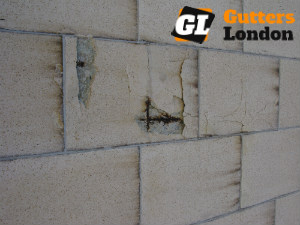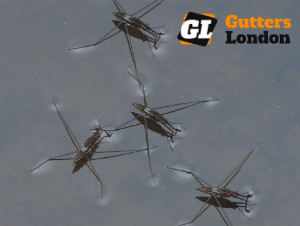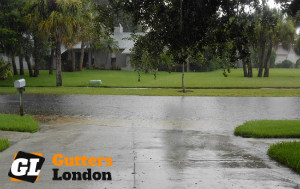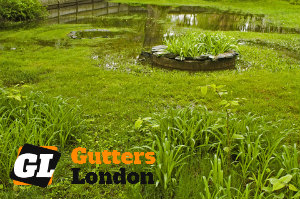The 8 Hidden Damages Clogged Gutters Bring (Part 2)
 We continue with more dangers that lurk behind every dirty gutter. Remember that these articles are not here to scare you into cleaning your gutters every weekend. They tend to educate you about what possible complications you risk if you completely ignore gutter cleaning. Complications such as …
We continue with more dangers that lurk behind every dirty gutter. Remember that these articles are not here to scare you into cleaning your gutters every weekend. They tend to educate you about what possible complications you risk if you completely ignore gutter cleaning. Complications such as …
Foundation cracks

The Problem: Foundation cracks, pretty obvious signs for foundation damage, can have a rather different meaning, depending on what material they are made from. There is a very informative article explaining the different shapes and directions of the cracks here. But overall, any cracks are a sure warning for further foundation damage. And that is not something you want to overlook. Potentially, you would risk harming the whole structural integrity of the building. Even if small and not harmful yet, cracks decrease the esthetic look of your facade.
The Reason: If you ask anyone working with concrete, he will promise you two things about it: it will get hard and it will crack. Since most foundations are made of concrete, this means that sooner or later some cracks will appear on it. And it shouldn’t worry you that much if they are no bigger than ¼ of an inch. But combined with leaking gutters, these little pickles can grow into enormous headaches in no time. Any running water will only dig deeper and harder into them and it will also accelerate the shrinking of the concrete itself (yes, concrete shrinks over time).
The Solution: You should first make sure the crack is dry and no water is reaching it. There might be some moisture so it’s best to first dry it with a hairdryer. If, after 15 minutes, the crack is still wet there is a water source that is still finding it’s way to it.
If it’s dry, the next step is to grind it and clear it thoroughly. Be sure no dust or other debris are left. Then, mix up your hydraulic cement, epoxy crack sealer or other crack-filling substance of your choosing. Fill the whole crack, as deep as you can, and smoothly spread it to match the wall.
Insect infestation

The Problem: Bugs! A whole gutter insect infestation. Where there is moisture, they tend to follow it. Mosquitoes love to lay their eggs in the still gutter waters. Carpenter ants, roaches, and earwigs also adore your wet and moisture-filled gutters. Birds shall be attracted to the insects as well and before you know it you will have your very own ecosystem living in your forsaken gutter pipes. Soon after you’ll start sharing your food with them and giving them names.
The Reason: If not cleaned regularly, leaves, twigs and other debris will build-up in your gutters. After some time there will be enough to completely clog the system, resulting in lots of still rainwater. Coincidentally, the mosquito’s heaven looks exactly like your blocked and clogged gutters filled with water that’s not moving. It offers everything they need – moisture, food, and protection.
The Solution: It is quite simple actually – clean your gutters regularly. Mosquitoes would surely visit you now and then, but without producing them a fancy place to live their numbers will surely be fewer. You can try different sonic repellents, LED light bulbs, electric fans, or any other bug-unfriendly gadget. If you want to go all green about it, plants like rosemary, marigolds, horsemint, sage, and catnip are nature’s version of a mosquito repellent. Your cat would be much grateful if you chose the last one.
Driveway/sidewalk damage

The Problem: Water from your obstructed gutters falls over your sidewalk or driveway, making it slippery and damaging the concrete. Furthermore, when it freezes in the cold months it will damage and can destroy completely the cement, leaving it a big mud arena for when Spring comes. Not to mention that ice isn’t the perfect surface for parking and walking area.
The Reason: When water constantly fall on the pavement, it will gradually wash away the soil under it. This can lead to sagging, cracking, and other types of issues to the driveway. Not much of an issue in the Summer, but when Winter comes and the temperatures decrease, that water will freeze and cause extra damage.
The Solution: Direct the water elsewhere. If your downspout leads the rainwater directly to a sidewalk, fix it. Make sure no water is falling from the edges of the gutters as well. If it is already cracked and sagging, try filling it with sand and sealing it with concrete. Another option is to install trenches along the driveway to drench the redundant water.
Flooded landscape

The Problem: When excessive waterfalls from your gutters and doesn’t damage your driveway, nor leaks in the basement, the next thing it reaches is your lawn and garden. Water might be good for grass and vegetables, but over-watering them is not. Moreover, if the plants die and their root system falls apart, you risk soil erosion and turning your once-green lawn into a dessert scene or a muddy living place for pigs.
The Reason: Too much water reaches the soil and floods it. It drowns any plants you might have. It even kills the grass and smaller trees. This further changes the soil, making it unfit for any plants and flowers. The water, not having anywhere to run trough, piles up and forms big puddles, transforming your previously beautiful garden into a swamp.
The Solution: The best solution here is prevention. But sometimes heavy rainfalls leave you with no choice. If the turf isn’t dead, meaning the surface wasn’t flooded for more than two-three days, you can gently rake the ground and place fertilizer. It will help the lawn recover more quickly. If the raining is too frequent, you can think of digging some trenches so excessive water will have a natural incline to run onto.
As you most probably noticed, prevention is the best guard against any water-related guttering problems. By preventing the circumstances that most often causes them you minimize as much as you can the risk of ever having any. It is our professional opinion that you should thoroughly clean your gutters at least twice a year when Autumn and when Spring starts.
You can always count on our gutter cleaners for help if you find the task difficult or undesirable.
